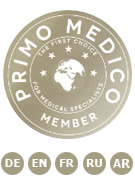How can I be accepted as patient at PSI?
Patients are usually referred to us by a clinic or specialist. New requests for treatment usually reach us via e-mail or telephone. Sometimes, relatives, friends, or patients themselves contact us for treatment. Please do not hesitate to contact our patient office if you have any questions. We are pleased to take your call or e-mail.
Which diseases are treated at the Center for Proton Therapy?
We treat the tumours listed on this website.
How long does the treatment take?
The total duration of the treatment series depends on the type of tumor, the therapies administered before, and planned for after proton therapy. The treatment is applied in daily fractions, from Monday to Friday, up to the calculated total dose which is supposed to destroy all tumor cells. The treatment for ocular melanomas takes only about one week (with daily fractions). For deep-seated tumors, our patients are irradiated daily, for five to eight weeks.
Where do patients live during treatment?
Usually our patients are treated on an out-patient basis and stay at home or in apartments or hotels close to PSI. They should not live alone, but should rather have a family member or friend with them during the course of treatment. Very rarely, patients need to stay in a hospital close to PSI due to treatment side effects. Because acute side effects are rather seldom under proton therapy, not many of our patients need to be hospitalized. Those who do need hospital care are usually being treated simultaneously with chemotherapy. Our patient office is more than happy to help you to find appropriate lodgings.
How much does the therapy cost and who pays?
Today, proton therapy is still much more expensive than conventional radiation therapy with photons in many countries. In Switzerland, too, the costs are more than twice as high as conventional photon therapy. The health insurers in Switzerland will cover the treatment costs for these indications. For patients from the European Union, the costs are usually reimbursed by the national health insurance providers by means of the E112 form (provided by health insurance company).
How is the sedation/anesthesia for proton therapy sessions in children carried out?
Your child will need to lie very still over a long period of time. To enable this, a deep sedation (deep sleep) / anesthesia is performed. Your child will be breathing on his or her own and, as an extra precaution, will receive additional oxygen via nasal cannula (tubes leading to the nose). For the sedation during proton therapy, the fast-acting anesthetic medication called Propofol is administered continuously into a vein. Your child will wake up again very soon after the infusion is stopped.
Must my child be fasting for the sedation/anesthesia during radio-therapy?
Yes; the same fasting times are valid as for general anesthesia during surgery. Until four hours before beginning anesthesia, your child is allowed a light meal (breast milk, formula, dairy milk, bread, cereal, yoghurt; only low fat foods). Until one hour before the procedure, clear liquids are allowed (water, clear apple juice, herbal tea with or without sugar, non-carbonated flavored drinks). In the recovery room your child can eat again as soon as it wakes up and feels like eating. The team is careful to plan the appointments so that your child is treated at the same time every day, or as close as possible, in order to maintain a regular eating schedule.
Is a deep sedation/anesthesia dangerous?
These days, anesthesia is very safe. Modern anesthetic medications are generally well tolerated and are quickly metabolized by the internal organs, so that your child wakes up quickly and feels well. In rare cases, respiratory problems (coughing, secretion, airway obstruction, breathing arrest) can arise during sedation. For this reason the anesthesiologist monitors your child continuously during the whole treatment in order to immediately detect and prevent any possible problems. With their state-of-the-art monitors and vast experience, the anesthesiologists work to keep the risks of a deep sedation/anesthesia to a minimum.
Does it harm my child if he or she must be repeatedly sedated/anesthetized over a longer period of time?
Many parents are worried about their child being repeatedly sedated/anesthetized over a longer period of time, as is necessary for radiation treatment. At this time, there are no reliable indications that children are harmed in any way through repeated narcosis. Decisive in this issue is not so much the choice of anesthetic medication, but much rather the capability of the anesthesia team to carry out a stable anesthesia. The team members must be highly qualified and experienced in the treatment and care of infants and small children (www.safetots.org).
Who can I contact? Who is willing to answer my questions?
Please do not hesitate to contact us with any questions you may have. Our patient office is pleased to take your call or e-mail. You can reach us from Monday to Friday from 8:00 a.m. to 5:00 p.m:
Tel.: +41 56 310 35 21 or
Tel.: +41 56 310 35 24
E-mail: protonentherapie@psi.ch
